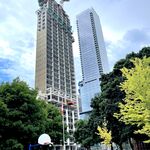I couldn't agree more. The TTC is already the least subsidized transit system on the planet, so charging the users more makes no sense. We need to start encouraging people to use PT by taxing more heavily individual car use.
First thing would be to bring back the VRT...only triple or quadruple it.
Public parking in Toronto is either free or ridiculously cheap. There should be no parking at all on major arteries (especially when there is a surface transit route). Are our arteries for getting around or is it a parking lot????? 1/3 to 1/2 our streets are used as parking lots....that's insane. If we are going to use public property for parking cars, then we have to start charging for it. $17 a month for street parking is stupidly cheap (and free parking is just lunacy). Compare that to private parking...it's more like $17 a day.
Congestion fees for downtown make sense. If it works elsewhere, it will work here.
Public transit surface routes that are in mixed traffic need to be given priority, which will generally mean giving it its own ROW. This is especially true for streetcar routes, which carry huge ridership. The only way to increase capacity for moving people on these arteries is to increase capacity for PT...we can't increase car capacity by making the roads bigger. PT needs to win and the car needs to lose in the battle over road use...plain and simple. Right now...everybody loses.
Tolling entry points to the city's major arteries means 905'ers start paying for infrastructure they use that they pay nothing for at the moment.
Toronto needs to spend a minimum of $1billion/year on transit infrastructure. You can actually start building subways with that kind of funding.
Stop listening to Rob Ford and his imaginary free "subways, subways, subways". He campaigned on building a $4 billion completed Sheppard subway looping with the BD line and the YUS line. It was to be built and operating by the Pan Am games, and be paid for by existing provincial funding and private sector development fees along its route....no cost to Toronto taxpayers....FREE!!! Future subways?....well, perhaps when another "free" ones comes along.
A: it could not have been built for only $4billion
B: it could not have been completed and operating by 2015
C: it involved imaginary private funding
D: it doesn't exist
E: you're an idiot if you fell for it
So Rob Ford only likes subways when he doesn't have to pay for them. Which means, Rob Ford will never be responsible for any subways, let alone "subways, subways, subways" (which is like...mega subways or sumpthin). Rob Ford would like to simply ignore public transit all together....just like anything else he doesn't like.
Wake up Toronto...we aren't progressive at all (we had our moments in the 60's and 70's)....we live in a blazingly ridiculous car culture city.




